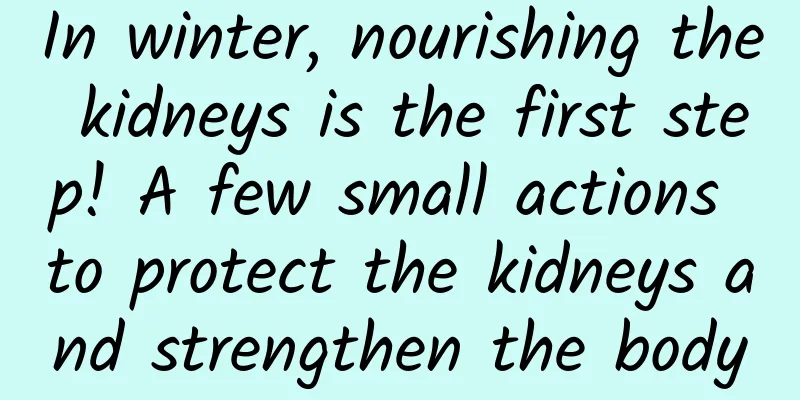In winter, nourishing the kidneys is the first step! A few small actions to protect the kidneys and strengthen the body

|
Editor's note: With the improvement of living standards, health has become the topic we are most concerned about. What is healthy food? How to prevent physical diseases in life? These have become the focus of everyone's attention. People's Health Network has launched the "Jintai Health Garden" column to take stock of the most healthy lifestyle for you and take you into the health garden. Winter health care is best for kidney health The Yellow Emperor's Classic of Internal Medicine states: "The kidneys are the root of storage and the place where the essence is stored." They store both the innate and acquired essences, and have the functions of storing essences and managing growth, development and reproduction, which corresponds to the winter in nature. In winter, the yang energy in nature is stored, the weather is cold and the ground is frozen, and all things are closed, which is most conducive to the storage of the human body's yang energy and kidney essence. At the same time, it is cold outside in winter, people move less and eat more, and the body's absorption function is strong and the anabolism is vigorous, which can well conserve yang energy and nourish essence. Therefore, winter health care is most suitable for nourishing the kidneys. Go to bed early and get up late, do moderate exercise Health preservation in winter should follow the principle of "sleeping early and getting up late to wait for the sun" in the Yellow Emperor's Classic of Internal Medicine. Winter is a season of silencing, so exercise is necessary, but not excessive. At the same time, it is not advisable to sweat too much during exercise, so as not to damage the yang energy and kidney essence, which violates the health preservation requirements of "hiding" in winter. In winter, go to bed early and get up late. It is best to get up and go out after the sun comes out. Going to bed early and going to bed early can ensure adequate sleep, which is conducive to the hiding of yang energy and the accumulation of kidney essence. Getting up late and going out late to wait for the sun can avoid severe cold and prevent the cold evil from dampening yang energy and damaging the kidneys. Remove cold, warm and protect Yang Qi Cold is the dominant air in winter. When cold evil attacks the body, in addition to causing acute attacks such as colds, acute bronchitis, chronic bronchitis, and bronchial asthma, it can often damage the yang energy in the kidneys, causing joint pain and arthritis, cold and numbness in the limbs, clear and long urination, and frequent urination at night. In winter, it is very important to get rid of cold and warm up, and to protect Yang Qi. In addition to using indoor heating facilities, the elderly and the weak should pay special attention to keeping their backs and feet warm. In addition, you must take good precautions against cold and keep warm when going out in winter. You should not wear too thin clothes during outdoor activities, and you should not stay outdoors for too long, so as to avoid the cold damaging Yang Qi and harming the kidneys. The diet should be warm, bitter and less salty Winter is cold, and the Yang Qi is hidden. The Yang Qi and kidney essence of the human body are also in a period of accumulation. The diet should be warm and should focus on storing heat. Therefore, in winter, we should choose foods that contain high-quality protein and have the function of preventing cold and keeping warm, such as chicken, beef, mutton, dog meat, eggs, walnuts, chestnuts, longan, red dates and other sweet and warm ingredients, or Chinese medicines that can be used as both medicine and food. These are all excellent seasonal health foods in winter. In winter, the kidneys are in season and kidney qi is relatively strong. The kidneys belong to water and taste salty, while the heart belongs to fire and tastes bitter. A strong kidney is easy to hurt the heart. Therefore, in winter, the diet and health care should "eat more bitter food and less salty food". For example, nuts are fried until they are slightly burnt and slightly bitter, which can both nourish the kidneys and clear away heat, and are most suitable for consumption in winter. Tonify the kidney, press the hands, hook the feet and pinch the Achilles tendon Traditional Chinese medicine has always advocated "nourishing the kidneys in winter" and introduces a set of kidney-nourishing movements that are simple and easy to learn, helping everyone to protect kidney qi and strengthen the body. Press the hands. Lie on your back with the backs of your hands pressed against your waist. After 5-10 minutes, you will feel a sense of heat all over your body. At first, your palms may feel numb and swollen when they are pressed against your waist, but this will disappear after 3-5 days of adaptation. According to Chinese medicine, this action is effective because the heat from your palms can warm up your kidneys when the Wailaogong (located on the back of your hands, in the depression between the second and third metacarpal bones) of your hands are pressed against your kidneys. 10-11 pm is the end of the Hai hour and the beginning of the Zi hour (11 pm to 1 am). At this time, the earth's energy is the most prosperous. The earth's energy is absorbed through the Neilaogong (located in the center of the palm, the opposite point of the Wailaogong), and directly injected into the kidneys through the Wailaogong. At this time, the kidney-tonifying effect is doubled. Hook your toes. Stretch your legs straight and put them together, hook your toes upward, hold your toes with both hands, and slowly press your body downward. Do this once a day for about 15 minutes each time. When practicing, you don't need to deliberately pursue the feeling of your body sticking to your legs, as long as you feel the tendons behind your legs straightened. Pinch the Achilles tendon. The locations of the inner and outer Achilles tendons are exactly Taixi acupoint (the inner side of the foot, the depression between the back of the inner ankle and the heel bone) and Kunlun acupoint (the outer side of the foot, the depression between the back of the outer ankle and the Achilles tendon). Taixi acupoint is the original acupoint of the kidney meridian, the "Yangtze River" that gathers the vital energy of the kidney meridian, and can enhance kidney function; Kunlun acupoint has the effect of harmonizing qi and blood, strengthening the kidney and strengthening the spine. Pinch and rub the two acupoints every day for 3 to 5 minutes each time, which can have the effect of nourishing the kidney and maintaining health. When pinching and rubbing, you can use the thumb of the opposite hand, or you can use a massage stick or a smooth wooden stick to press and rub. In addition to the feeling of soreness and swelling, it is best to have a "numb feeling" as the degree of strength. Beware! Five distress signals from the kidneys 1. Changes in urine volume Normal people urinate 1000-2000 ml per day, with an average of 1500 ml. Whether the amount of urine increases or decreases, it may be a manifestation of kidney disease. In particular, normal people rarely urinate at night. If you find that you have to get up several times at night and don’t drink much water before going to bed, you should be more alert to kidney disease. 2. Changes in urine characteristics Normal urine is transparent light yellow. If you drink less water or urinate for the first time in the morning, the color will be slightly darker. If your urine is red or foamy, you should go to the nephrology department for a checkup. 3. Edema The kidney is the organ that metabolizes water in the human body. If the kidney is not healthy, water will accumulate. If some people wake up in the morning and find that their eyelids are swollen, or their feet and legs are swollen, they should consider kidney problems. 4. Digestive tract symptoms such as nausea and vomiting When kidney disease develops to the terminal stage, it will affect gastrointestinal function, leading to symptoms such as nausea, vomiting, and loss of appetite. Therefore, if these symptoms occur, in addition to seeing a gastroenterologist, you should also pay attention to ruling out kidney disease. 5. Skin itching For patients with end-stage renal disease, urea in the body cannot be excreted through urine and will be excreted through the skin, thereby irritating the skin. In addition, toxins accumulated in the body can lead to peripheral neuropathy and also cause skin itching. How to detect kidney problems early? How can you know early if you have kidney problems? Remember to do the following three tests during your annual physical examination: 1. Urine test: In the early stage of chronic kidney disease, urine is collected for routine urine examination. If indicators such as urine protein, urine occult blood, urine red blood cells, and urine white blood cells are positive or exceed normal values, the cause must be further investigated. 2. Blood test: Generally, the blood creatinine test is included in the biochemical test form of the physical examination. It is an important indicator of kidney function. If abnormalities are found, it indicates that the kidney function may be damaged to varying degrees. 3. Do a kidney ultrasound: observe the kidney size, renal cortical thickness, and whether the kidney structure is clear. For example, the kidney of a normal adult is about 10 to 12 cm long, 5 to 6 cm wide, and 3 to 4 cm thick. The specific size will fluctuate due to the height and weight of each person. However, if there is a large deviation, such as an ultrasound finding that an adult's kidney is only 8 cm or even smaller, it means that the kidney is atrophied, which is one of the manifestations of chronic kidney disease. If the test results of the above three items are normal, kidney disease can basically be ruled out. Eight golden rules to prevent kidney disease Following the following eight golden rules can effectively reduce the risk of kidney disease and protect kidney health. 1. Maintain a healthy lifestyle It is very important to have a regular lifestyle and stick to an exercise-based lifestyle. Make an exercise plan that suits you, such as brisk walking, jogging, swimming, cycling, Tai Chi, etc., and stick to it so that you don't feel tired after exercise. Appropriate exercise can help control blood sugar, maintain blood pressure at standard levels, and reduce the risk of kidney disease. 2. Eat a balanced diet and maintain a normal weight Diseases come from the mouth. To prevent kidney disease, you should pay attention to a balanced diet and maintain a normal weight. Choose fresh ingredients and healthy cooking methods. Control the daily salt intake of each person to 5-6g (about 1 teaspoon of salt). Limit processed foods with high salt, preservatives, and additives. Obesity is closely related to kidney disease, so pay special attention to avoiding abdominal obesity. 3. Ensure adequate drinking water Long-term dehydration can easily cause urinary tract infections, kidney stones, etc. Scientific drinking water can help prevent kidney disease. It is recommended that adults drink 1500-1700 ml of water per day, preferably boiled water or light tea. People with hot weather, heavy exercise, excessive sweating, and kidney stones should drink more water. Drink water evenly throughout the day to avoid drinking large amounts of water continuously in a short period of time. However, it should be noted that patients with severe renal impairment, severe edema, heart failure and other diseases should limit their water intake. 4. Quit smoking and limit alcohol consumption Tobacco's harmful substances can cause renal function decline in a dose-dependent manner by damaging kidney cells, impairing renal tubular function, and affecting renal hemodynamics. For patients with chronic kidney disease, smoking can significantly increase the risk of cardiovascular and non-cardiovascular complications and mortality. Long-term heavy drinking is also a risk factor for acute kidney injury, and can also lead to increased blood uric acid, gout, and increased creatine kinase. 5. Do not use medication blindly and be alert to drug interactions Drug-induced renal injury is an important cause of acute renal injury. The elderly are at high risk of drug-induced renal injury due to decreased renal perfusion, decreased drug excretion and tubular damage repair function, as well as hypertension, diabetes, cardiovascular and cerebrovascular diseases, etc. The most common drugs that cause renal injury are non-steroidal anti-inflammatory drugs, aminoglycoside antibiotics, contrast agents, and Chinese herbal medicines containing aristolochic acid. All of the above drugs should be used under the guidance of a physician and should be avoided in large quantities and for a long time. 6. Control blood sugar, blood lipids and blood uric acid levels Diabetes has become the leading cause of chronic kidney disease among urban residents in my country. Regular monitoring of blood sugar, blood lipids, and blood uric acid is very important. Long-term control of these indicators can effectively reduce or delay the occurrence and progression of chronic kidney disease. Patients with these diseases are advised to regularly check urine routine, urine microalbumin, etc. Once symptoms such as increased foam in urine and edema occur, they should go to the nephrology department for treatment in time. 7. Monitor your blood pressure Hypertensive renal damage is damage to kidney structure and function caused by hypertension, and is one of the important causes of end-stage renal disease. If blood pressure is between 130/80-139/89 mmHg, you should be alert to early hypertension, pay attention to improving your lifestyle, and actively control your blood pressure. If blood pressure continues to rise above 140/90 mmHg, it is recommended to start drug treatment. Patients with combined proteinuria should try to control blood pressure below 130/80 mmHg, and monitor changes in urine protein and renal function. 8. Regular physical examinations Regular physical examinations can effectively detect early kidney damage. It is recommended that physical examinations include urine routine, renal function, renal ultrasound and other items. Patients with high risk of kidney disease such as hypertension, diabetes, hyperlipidemia, hyperuricemia, gout, cardiovascular and cerebrovascular diseases, obesity, sleep apnea, etc. should go to the hospital regularly to test the above items, and if necessary, conduct urine microalbumin/creatinine ratio, renal tubular function, renal vascular ultrasound and fundus examination. (People's Health Network compiled from China Traditional Chinese Medicine News, Life Times, Beijing Daily, Guangzhou Daily) |
<<: Who can't eat fennel? How to make fennel dumplings
>>: Is fennel a food that causes allergies? What are the side effects of eating fennel?
Recommend
Why do women have stomach pain in the morning?
Most women have abdominal pain. Experts suggest t...
29 weeks pregnant belly button pain
Women have to endure a lot of pain during their t...
To those of you who eat grass: It’s a lot of pain, but it’s even more painful to weigh it? Teach you the right way to eat it →
For those who want to lose weight What to eat eve...
Can you chew betel nut every day? What will happen if you smoke betel nut?
Betel nut is a common food in life, especially in...
How much does a fallopian tube laparoscopy cost?
There are two types of fallopian tube blockage. O...
What is Down's syndrome screening during pregnancy?
Down syndrome screening is a new item in prenatal...
How to clean uterine waste
There is a lot of garbage in a woman's uterus...
Complete list of fruits to eat during pregnancy
It is very beneficial for pregnant women to eat m...
Premature ovarian failure makes girls older! Are your ovaries still young?
Content from : Gu Zhuowei Shanghai Renji Hospital...
What should women do if their breasts are not well developed?
What should women do if their breasts are not wel...
What causes abdominal pain after childbirth?
If any of your friends experience abdominal pain ...
Why do some girls have more body hair than boys? Be careful of this disease!
Every summer, some girls will face a different pr...
One reason is enough to advise you to eat more apples!
An apple a day keeps the doctor away. I'm sur...









